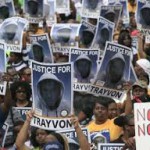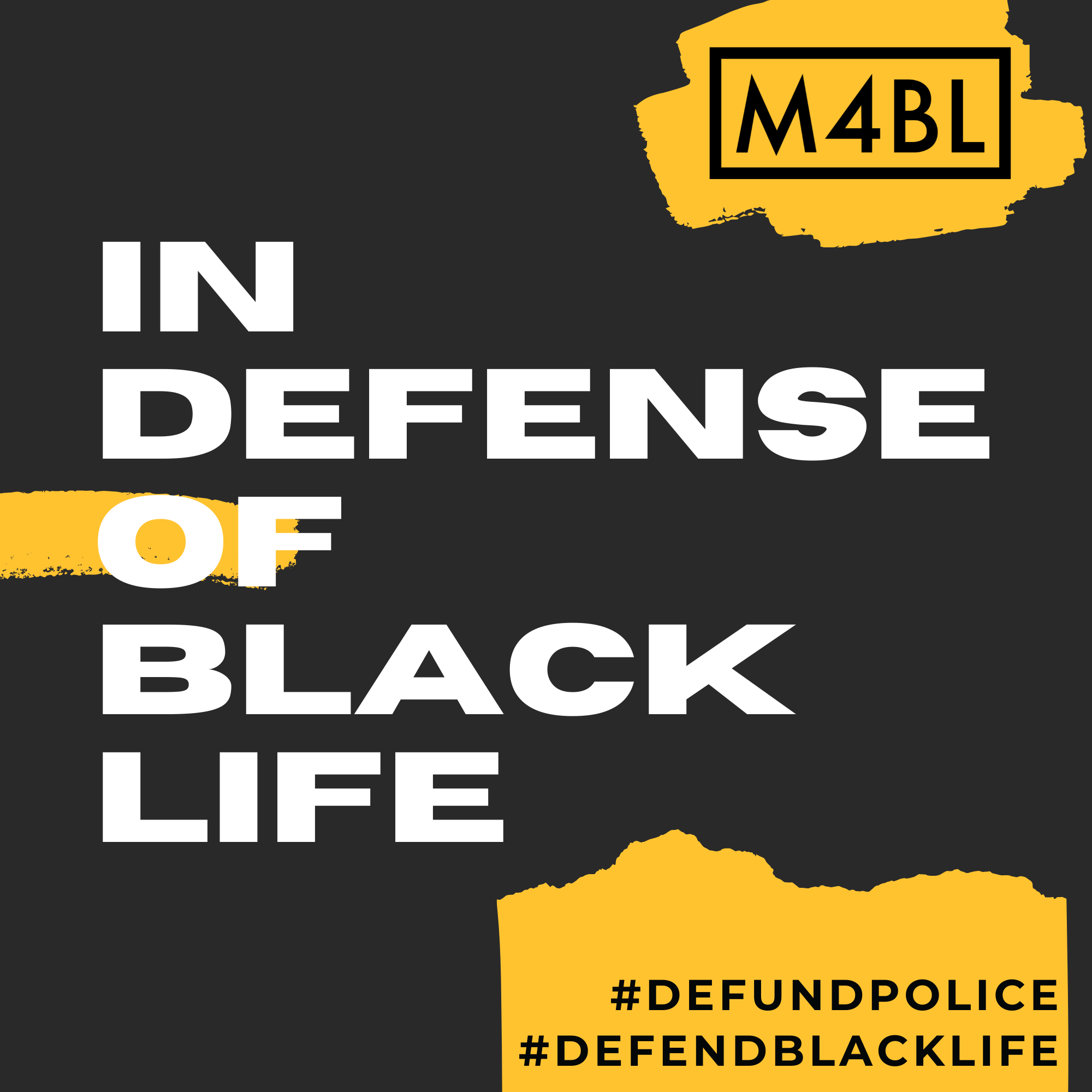 This post was written by Ashley Horan, James Schaffer, Sarah Abbott, and Isaac Lev Szmonko
This post was written by Ashley Horan, James Schaffer, Sarah Abbott, and Isaac Lev Szmonko
“Justice was always going to elude Trayvon Martin, not because the system failed, but because it worked. Martin died and Zimmerman walked because our entire political and legal foundations were built on an ideology of settler colonialism — an ideology in which the protection of white property rights was always sacrosanct; predators and threats to those privileges were almost always black, brown, and red; and where the very purpose of police power was to discipline, monitor, and contain populations rendered a threat to white property and privilege.” –Robin D.G. Kelley
When the Zimmerman verdict came down on the evening of July 13, member leaders and allies of the Resource Generation community were gathered together in a multi-generational, multi-class group for the first-ever RG Transformative Leadership Institute in Northfield, MN. In those first few hours after Zimmerman was acquitted, we experienced a wide range of emotions: grief, rage, pain, disillusionment, frustration, numbness. We processed our reactions together, held each other, and sang and wept and held Trayvon Martin, his family, and all the people far and near who are so hurt–and so directly implicated–by this verdict in our hearts.
But the following day, our initial shock and anger gave way to something else. A large group of us convened, and talked about what this verdict means, what to do going forward, and why people like us, many of whom have most benefited from capitalism and racism, need to care about justice for Trayvon Martin and all the young Black and Brown men he has come to symbolize. This blog post represents the reactions and thinking of a small group of us in the wake of those conversations.
Because of our privilege–which, for many of us, includes white skin privilege as well as wealth and social capital–we are not often the victims of systemic oppression and structural violence. But that makes it all the more important to allow ourselves to feel all the emotions that have come up in the wake of Trayvon Martin’s death. And it’s important to acknowledge those feelings because the largely white, wealthy communities many of us come from can so easily lean towards analytical and “objective” reaction, meaning that we bypass the real human suffering and lived experiences of the people most intimately impacted by violence and oppression. By parsing the laws, by solely responding through intellectualizing what’s happened, we distance ourselves from empathy. As people who’ve been taught not to notice or express our feelings, we know that part of our own path of liberation is to pause and take the time to feel. And so, first and foremost, we state that we, as young people with wealth, are grieving this verdict along with many, many others around the country. We are hurt; we are angry; we are deeply, deeply sad.
One reason those emotions run so deep for us is that we share–individually and as an organization–a yearning for racial justice. While those of us writing this blog post all identify as white, our larger RG family includes many young people of color with wealth whose life experiences attest to the fact that climbing the economic ladder and gaining class privilege can never entirely shield people of color from the daily, lived realities of racism in america. Wealth can certainly advantage people of color, but it does not eliminate the effects of racism entirely. And importantly, we know that individual people gaining access to wealth is an individual solution to a systemic problem.
As wealthy people committed to the redistribution of wealth, land, and power, we know that many of our families have accumulated money, power, and land as a result of the exploitation, enslavement and genocide of indigenous people and people of color. We know that the racial wealth gap began long ago in this country, and remains a nearly un-bridgeable chasm for most individuals and communities of color today. We know that the mass incarceration of Black and Brown people perpetuates generational poverty, family fracture, unemployment and disenfranchisement, and keeps the myth of “upward social mobility” out of reach for too many. Knowing all of this, and as people committed to building a world in which money, land and power are equitably distributed, we know that we must be committed to racial justice and anti-oppression in everything we do.
So what does this have to do with Trayvon Martin and the Zimmerman verdict? A lot. We can trace what happened in Sanford, FL, on that night in 2012–and in the courtroom this summer–directly back to our nation’s history of protecting the wealth, property, and comfort of rich white folks going back hundreds of years.
The “Stand Your Ground” laws that came to such public prominence after Trayvon Martin’s murder are direct descendants of the English common law that was imported to this country during the first years of white colonization of indigenous land. Originally, this “castle doctrine” stated that if someone were attacked in their own home, and had their backs to the wall with literally nowhere to run, they had the right to defend themselves using deadly force.
Later on the American frontier, as white settlers stole more and more indigenous land and met with inevitable resistance from native peoples, these laws were invoked frequently. For these laws to work in favor of white settlers, as opposed to the native people who were “standing their ground” to defend their land, culture, and lives, the nation’s courts had to believe that white lives and property have greater value than the lives of communities of color. In the slave states, where chattel slavery was the law of the land and the force behind the economy up to and during the Civil War, the courts and social systems evolved specifically to reinforce and protect the rights of wealthy whites to own Black bodies as property. Through the years, the particular American forms of racism and classism colluded to convince white people that it was more and more necessary to protect their wealth and property from perceived threats, and the parameters of these laws–both what was considered the bounds of one’s “castle” and the circumstances in which killing in “self-defense” became justified–expanded considerably. Most notably, the “duty to retreat” clauses were slowly eliminated.
The last decade has seen an exponential expansion of these kinds of warped versions of “castle doctrine laws.” Since 2005, with the help of the National Rifle Association, the radical right-wing lobby group ALEC (the American Legislative Exchange Council) has pushed through Stand Your Ground laws in more than 20 states, many of which give the same broad latitude to the person feeling “threatened” as Florida’s Stand Your Ground.
ALEC is funded by a group of global corporations, and in their own words: “Corporations have a Voice and a Vote”. It is not coincidental that ALEC is also pushing for other radical laws intended to protect the interests of white wealthy people. Also on ALEC’s legislative priority list are proposals for sweeping voter suppression laws, reducing or eliminating income taxes, blocking paid sick leave for workers, and undoing minimum and living-wage laws, to name just a few.
To get passed and effectively divide people of all colors and classes against one another in order to protect the power and assets of wealthy whites, laws like these depend upon deeply embedded structural racism, fears of scarcity, and beliefs about the “laziness” and “criminality” of poor people and people of color. And so, by the time Trayvon Martin was walking home that February night, those systems were already working against him. Systems that create gated communities where only certain kinds of people “belong.” Systems that tell all people–not just whites–that Black men are a threat to safety and property. Systems that create so much fear of the “other” that vigilantism is not just excusable, but encouraged. Systems that work so pervasively on the minds of citizens that even when laws like Stand Your Ground are not explicitly invoked at trial, the assumptions that underlie them are undeniably at play.
This history makes it clear that Trayvon Martin’s death was not an isolated tragedy, and George Zimmerman’s acquittal was more than a few jurors in Florida reaching conclusions based on their personal fears or racism. Although Zimmerman was not himself a wealthy white person, his actions and beliefs had been shaped by these systems that collude to engage people of all races and classes in protecting the interests of the white owning class, too frequently at the expense of Black and Brown bodies. From Trayvon’s murder to the jury’s verdict, the whole situation is the byproduct of hundreds of years of American history rooted in the toxic soil of economic inequality, capitalism, racism, and structural violence.
But sometimes, that history feels too abstract in the gaping hole left by the death of a very real 17-year-old boy. So it’s not surprising that so many hearts broke on July 13 when George Zimmerman was set free. Such a long and painful history makes our spirits cry out for a better way. “Justice for Trayvon,” thousands of protest signs declared around the world.
While our grief is personal, our thinking needs to be systemic. What we yearn for is a society in which none of us is motivated to violence by fear of people different from us. This is a vision that feels far away from the realities we see around us, and it’s tempting to seek more tangible solutions–solutions like sending George Zimmerman to prison. But we know that just as locking one more individual in a cage will not bring Trayvon Martin back to life, neither will it bring the world we dream of into being. We cannot turn to a system that is central to the violent oppression of young Black men in this country, and expect that it can provide justice for a young Black man and his family. We must seek other solutions when then that system, predictably, fails to heal us, shift the systems that led to Trayvon’s death, or help us to build the power we need to create systemic change. We must think beyond imprisonment as the only way to seek justice. As Audre Lorde famously said, “The master’s tools will never dismantle the master’s house.”
So what do we, as young people with wealth, need to do now?
We must allow ourselves to experience the grief, pain, rage and loss we feel, letting those emotions connect us with people of all races and classes who are also grieving, and who continue to be directly impacted by unjust systems. We must claim racial justice as a non-negotiable goal and method in our work. We must commit to working strategically to leverage our privilege and resources on the personal, communal and national levels to redistribute money, power and land. We must fund and back black-led organizing for systemic change. We must talk to our families and friends. We must publicly resist unjust policies. We must develop the moral imagination to create systems of justice that lead to true reparation and healing. We must nurture deep and accountable relationships with individuals and organizations led by those most impacted by the systems we seek to dismantle.
And we must understand our work, our lives, and our liberation as inextricably bound up with that of every other person on this planet. With that at the center of our work and our hearts, we believe that one day, we will see justice for Trayvon, and justice for all people.
Action Steps (Reposted from the Catalyst project):
Get involved with local racial justice efforts. Listen to voices of color, especially Black folks. Talk to your people, especially the ones who don’t get what’s going on. Write letters to Marissa Alexander (address below) and Trayvon Martin’s mother.
Figure out how you can be in this for the long haul. Join an organization, or if you’re already part of something, help friends plug in somewhere meaningful.
Support Black activists and Black organizing projects materially and financially. Support national organizing and also directly supporting organizing in your area. This national list of grassroots racial justice organizations contains many groups rooted in Black communities, and this is only one place to start.
Sign Color of Change’s petition to repeal Stand Your Ground laws, a key intervention supported by folks ranging from the NAACP to Malcolm X Grassroots Movement.
Sign the NAACP’s petition for the Department of Justice to open a civil case
Join the conversations about privilege, power and justice at We Are Not Trayvon Martin.
Keep posted on proposed next steps from Malcolm X Grassroots Movement.This is their list of key interventions. Can you contribute to this racial justice agenda?
-
Repeal the “Stand Your Ground Law”
-
Immediately Release Marissa Alexander
-
We call for the elimination of the Police Bill of Rights and the numerous civil service rules and judicial policies and procedures that give the police anonymity, freedom from having their behavior recorded and virtual immunity from accountability and prosecution.
-
End to the various polices of containment such as racial profiling, stop and frisk, gang injunctions, secure communities, etc.
-
End the “War on Drugs” and all of its related laws, policies and programs
-
Enact democratically elected “Police Control Boards”, with the power to fire, subpoena, and indict police officers for human rights violations
-
Demilitarization of domestic law enforcement, including eliminating the use of Drones and various surveillance operations and institutions.
-
The redirection of military funding to social programs, such as public education, housing, health care, public transportation, and grassroots-controlled programs to prevent domestic and intra-communal violence.
-
Legislate and enact a National Plan of Action for Racial Justice that will make the United States government compliant with all the norms and standards of the Convention on the Elimination of all forms of Racial Discrimination (CERD) on all levels



I came here via Enough.org, which I also just discovered today. Whoever is behind your movement is full of the ANSWER: LOVE.
How do I know? You all are demonstrating humankind’s greatest ability: COMPASSION.
Thank you for guys for realizing that we are standing on the same chessboard, and that if some lose all lose.
I hope you all never lose initiative in the face of ignorance. People will mock you all for volunteering towards this cause, but I believe you are modern saints and maximizing your human potential.
(27 year old Brother raised in Newark, NJ and resident of Baltimore, MD)
This is quite a post, on so many levels.
The fact that you acknowledge your great fortune in life, does my heart good. For sure, not all young people do that, and as a parent of someone in your age group, who does the same, I hope your parents know this. It’s a gift to them.
I taught elementary school and pre-headstart, in Bedford Stuyvesant, in the late 60’s, and witnessed small changes…but sadly, I still see so much of the way it was, even before the civil rights movement. I always think of the song from South Pacific, “You have to be carefully taught.” It perfectly encompasses my thinking about all hate.
If you think back, did your parents teach you about hate? Did they use slurs about race, religion, sexual orientation, ethnic groups? Did they tell “jokes” about any of those categories? Or did they teach and behave in such a way, that led to where you are today? We can trace hatred of any group, back to the stone ages, if not before that, but, while studying it is a good thing, it’s not going to bring about an immediate solution. Learning to hate starts in the home. The street can enforce that, but if the germ isn’t there, it will have a hard time infecting.
I like reading all your suggestions, and yes, the government must review and bring change to all laws that can be abused. Personally, I’d start with enforcing strict gun control, if that was possible. Sometimes I think I’m dreaming about all people believing that, the way I do, but at the very least, there has to be a continued campaign to change minds. Maybe very wishful thinking. But, at any rate, it must continue.
Changing minds…how about hearts and minds? Why are we thousands of miles away, trying to do that to people, who clearly, have been living the way they do, forever, and don’t want us there? The amount of money we have spent on doing something, almost futile, not even mentioning the cost of lives, the pain and the hardship for families, should have been used to elevate the living right here. Do the ones who vote for cutting services for the neediest…the very young, and the elderly, and those who view their futures, as being right now, and who see a country that doesn’t seem to care, have a shred of decency? We all know the answer to that.
I know I’m all over the place…I tend to get like that when my strong passions surface. So I’ll just end by saying, be proud, be very proud, of the people you’ve become. May your numbers increase.